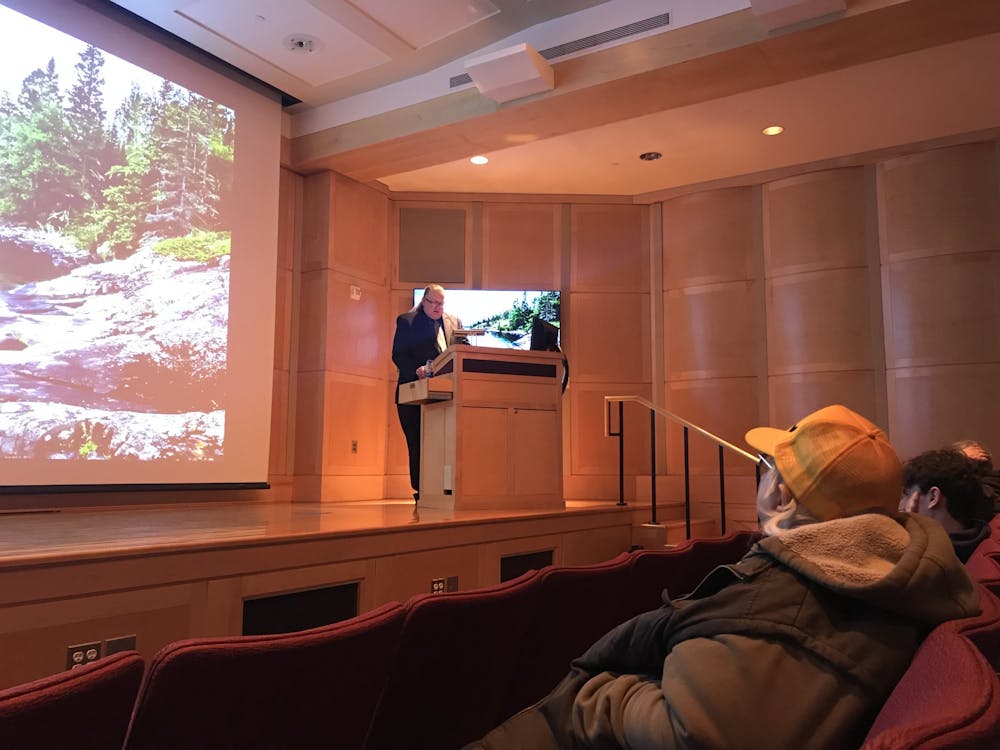Environmental reporter Tom Henry speaks about fake news, science reporting

Environmental reporter Tom Henry speaks about the intersection of fake news and environmental reporting on Nov. 14 in the Sarah and Daniel Opperman Auditorium.
Frank King became a national advocate for pipeline reform after his 10-year-old son, Wade King, was caught in fire from the Olympic gas line explosion in Seattle in 1999. Wade had been an avid baseball-lover before he passed away days later.
When Wade asked why he had to die, King comforted his son by saying, "Heaven needs a catcher."
Kim Tolnar attempted suicide by pulling a catheter out of her chest following months of leukemia treatments. She had been one of several graduates of the River Valley school district who was exposed to toxic chemicals from under the district’s former middle school.
King, Tolnar and Kiribati islanders, whose homes are sinking as sea levels rise, are all victims of environmental issues and hazards. Environmental reporter Tom Henry shared their stories as part of his presentation, “The Hard Truth: Science Happens.”
Henry spoke to a group of students, faculty and Mount Pleasant community members Nov. 14 at the Sarah and Daniel Opperman Auditorium, just two days before "Central Michigan Life’s Centennial Celebration."
The alumnus and former Central Michigan Life reporter relied on his personal experiences to highlight the importance of journalism, especially in a time where disdain for the media continues to increase.
"What the public doesn't see is how much seasoned talent and institutional knowledge is being lost, and how that affects accountability of public officials, access to public records, the media's power, and yes, democracy," Henry said.
Weaving in personal anecdotes, current events and other journalists’ stories, Henry drew connections between climate change deniers and the term “fake news.”
"Climate deniers don’t ever actually have to prove their case – they just need to confuse the hell out of people, which they’ve become good at,” Henry said. “But the evidence keeps mounting and we as a society continue to be the proverbial frog in a kettle of water that’s slowly being warmed.”
As Henry stated in his 2015 CMU Hall of Fame induction speech, he acknowledged that the media is not perfect, but argued that the “decimation of the American newsroom is the greatest assault on democracy.”
“What bothers me about the term fake news isn’t so much the name-calling, it’s the intellectual laziness of it,” he said. “(The term fake news) is agenda-driven – it promotes a kill-the-messenger mindset by dismissing hard work and degrading journalists.”
During his presentation, Henry shared that he had always wanted to be a writer and discovered a passion for journalism, eventually drawing him to the "messiness" of environmental reporting.
“Those scientific gray areas that drive some reporters and editors nuts are what fascinate me,” Henry said. “As an environmental reporter, you must learn to raise your game and be more street savvy. You must learn to decipher scientific gobbledygook, learn who to trust and who’s trying to push an agenda on you.”
Henry currently writes for the Toledo Blade as an environmental-energy reporter, and he has contributed to multiple publications, ranging from the Washington Times to the Pittsburgh Post-Gazette and Dayton Daily News.
Henry listed multiple reasons for why he does what he does, but he emphasized a sense of responsibility to communities and people like King, Tolnar and Kiribati islanders.
“All writers, especially those who cover specialty beats like the environment, have an enormous responsibility," Henry said. "We have the power to needlessly inflame a community, or worse, put people to sleep about issues they truly need to know about."



